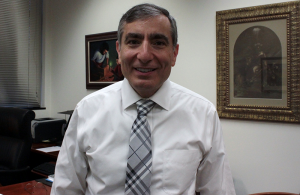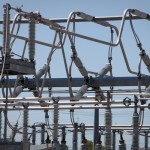Better Batteries Might Hold Enough To Power Your Neighborhood

Davew Fehling
James Tour leads research at Rice University to develop smaller, more powerful batteries.
One of the nation’s leading researchers who’s trying to make batteries better is James Tour and his colleagues at Rice University.
“Everybody’s investing billions. If you say millions they scoff at you,” Tour told News 88.7.
Tour says there are three categories of things that need better batteries: portable electronic devices, electric vehicles, and a use we wanted to learn more about: batteries to store huge amounts of electricity to power homes and businesses.
“We are not there yet to be able to store large amounts of electricity. So in other words you have huge banks where you can store electricity at night while people are sleeping.”
Storing electricity could be great for Texas. Statewide demand is growing with big spikes during a few hours a day, like late afternoons in August when everyone gets home and cranks up the AC. That’s when the batteries could release the electricity they stored over-night when there was less demand.
Theoretically, having power stored up for peak times could lessen the need to build big and expensive new power plants in Texas. But there are a couple problems: the batteries need to have giant capacity but be small enough to be practical. And there’s a political problem.
o far, the one company proposing such a project is Dallas’s utility company Oncor who would place batteries as big as dumpsters in communities in North and West Texas. Oncor’s counterpart in Houston, CenterPoint Energy, told us while Oncor’s project might have promise, it has one big problem: In Texas, it would be illegal.
S“Oncor is just strictly a wires company, they can’t own any generation. Under current law, they can’t generate,”Geoffrey Gay is a lawyer who specializes in utility regulation.He explains that when Texas de-regulated its electricity market years ago, lawmakers decided that the companies like Oncor and CenterPoint should only distribute electricity, not make and sell it. But that’s what Oncor would be doing if it set up a network of batteries to store electricity then sell it back into the grid. To actually implement its project, Oncor would have to convince Texas lawmakers to change the law.
Gay, who represents city governments in utility rate cases, says customers shouldn’t have to battery project which could cost a couple billion dollars.
“I think the cities will oppose it if they don’t see all the profit from these batteries flowing back to benefit ratepayers,” Gay said.
(Oncor did not provide a representative for us to interview.)
Meantime, there are experimental projects already in place, like one in West Texas at the site of some wind turbines. That project is funded in part by the federal government and is said to be the largest such energy storage facility in the nation. It uses batteries stacked together in a small warehouse-style building. Wind-generated electricity is stored in the batteries and when the wind stops blowing, they release the electricity into the grid.
Even more futuristic work is underway at the University of Houston. Using part of a $2 million dollar federal grant, the school’s engineering department is trying to find a way to store energy in magnets.
It involves the technology called “superconductivity” which uses ribbons of wire made of expensive metals.Researchers at UH are looking for cheaper alternatives. Venkat Selvamanickamis the lead scientist.
“I think in the next ten years some of this new technology will happen,” said Selvamanickam. “Biggest thing is, they want to keep the lights on.”
Which someday might be accomplished by running whole neighborhoods … on batteries.

